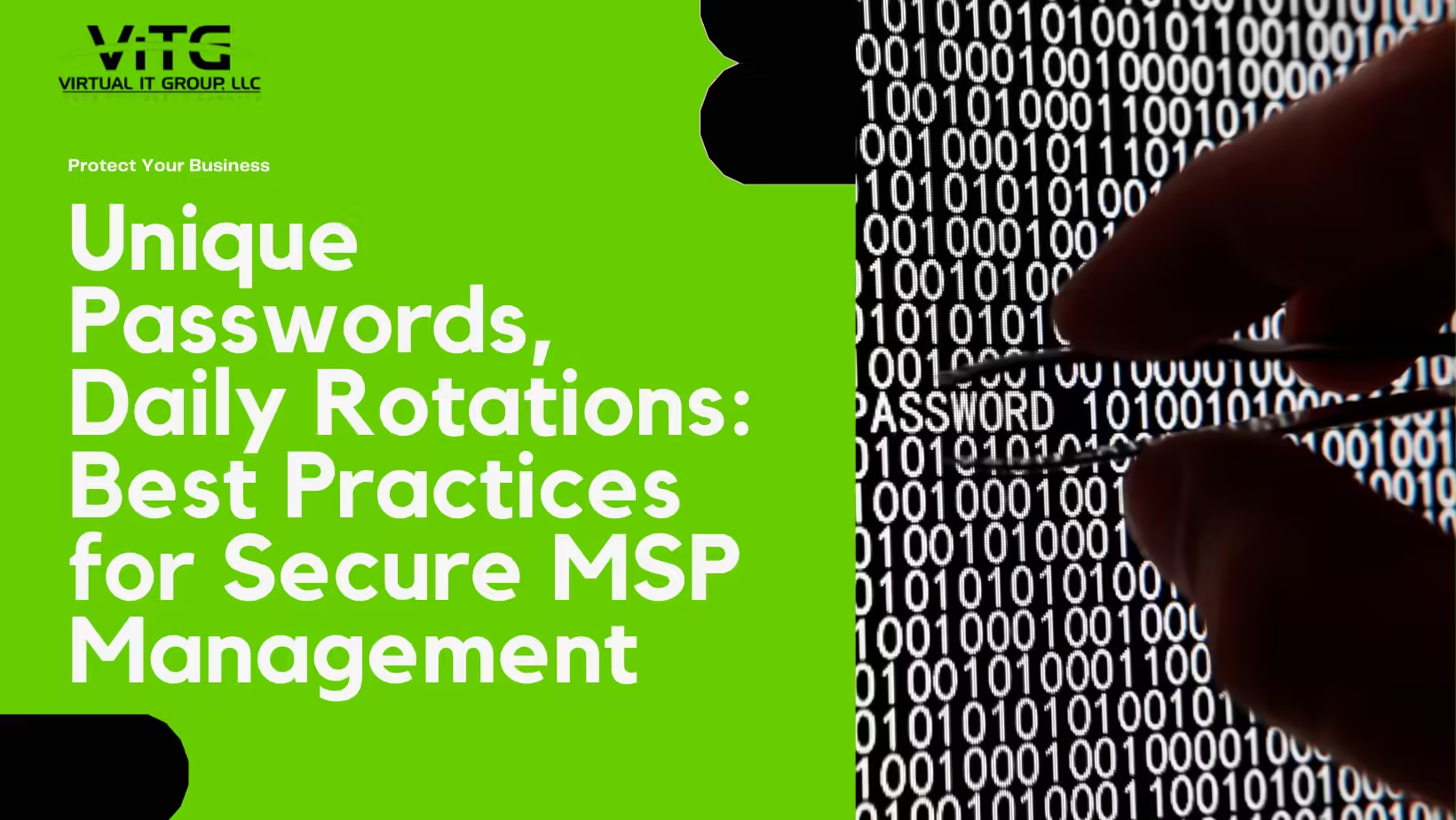In the ever-evolving world of cybersecurity, managed service providers (MSPs) are on the front lines of protecting sensitive client data, ensuring the smooth operation of IT systems, and responding to security incidents. As organizations increasingly rely on MSPs to manage critical infrastructure and cybersecurity defenses, it’s essential that MSPs themselves adhere to stringent security protocols. One of the most fundamental aspects of secure MSP management is password hygiene, which includes the use of unique passwords and regular password rotations.
This article will explore the best practices for password management in the MSP industry, focusing on the importance of unique passwords and daily rotations. By following these strategies, MSPs can significantly reduce the risk of cyberattacks, protect their clients’ data, and enhance overall security posture.
The Importance of Password Security for MSPs

MSPs have access to many sensitive systems and data, often across multiple clients. This access makes them a prime target for cybercriminals, as compromising an MSP can grant attackers entry to many businesses in one fell swoop. For instance, the SolarWinds hack in 2020 showed how a breach in an MSP’s supply chain can have devastating ripple effects, affecting thousands of organizations globally.
Given the elevated risk, MSPs must implement strict password management practices. Passwords are often the first line of defense, and weak or reused passwords can act as an open door for hackers. In particular, the following password management strategies are essential:
- Unique Passwords for Every Account: Reusing passwords across different systems or client accounts is one of the most significant security risks. If a single account is compromised, hackers can easily use the same password to gain access to other systems. Unique passwords for each account prevent attackers from moving laterally through systems once they’ve breached a single password.
- Daily Password Rotations: Constantly changing passwords, preferably daily for critical systems, can greatly reduce the window of opportunity for attackers to exploit stolen credentials. Daily password rotations ensure that even if an attacker gains access to a password, it will soon be invalidated, limiting the damage they can cause.
Why Unique Passwords Matter in MSP Management
Unique passwords are crucial because they act as individual keys for each system or account, reducing the likelihood that a breach in one area will lead to a domino effect across an MSP’s client base. Here are some key reasons why unique passwords are non-negotiable for MSPs:
- Reducing the Impact of Credential Stuffing: Credential stuffing is a common cyberattack where attackers use stolen usernames and passwords to gain unauthorized access to multiple accounts. When passwords are reused, an attacker can compromise several accounts with little effort. By using unique passwords, MSPs make it much harder for attackers to succeed.
- Having a Breach: If an attacker gains access to one account due to a weak or compromised password, using unique passwords for other accounts prevents the attacker from accessing added systems. This containment strategy is critical for MSPs, who manage multiple clients with various levels of access.
- Compliance with Security Standards: Many industries, such as healthcare and finance, require organizations to follow strict password policies as part of their regulatory compliance. Using unique passwords is often a requirement under frameworks like HIPAA, PCI-DSS, and NIST. Not following these standards can result in fines, reputational damage, and lost business.
The Role of Daily Password Rotations
Daily password rotations further enhance security by ensuring that even if a password is compromised, it is only usable for a brief period. W. While daily rotations may seem extreme, they are vital in high-risk environments, such as those managed by MSPs.
- Minimizing Exposure: If an MSP is using daily password rotations, an attacker who gains access to a password one day will find it useless the next. This dramatically reduces the time during which an attacker can run undetected.
- Reducing Human Error: One of the most common ways passwords are compromised is through human error, such as falling victim to phishing attacks or accidentally sharing credentials. Daily rotations minimize the impact of these errors, as even shared or stolen passwords quickly become outdated.
- Responding to Emerging Threats: Cybersecurity threats are constantly evolving, and zero-day vulnerabilities can be exploited before patches are available. By rotating passwords daily, MSPs can stay ahead of attackers and respond more effectively to appearing threats.
Best Practices for Implementing Unique Passwords and Daily Rotations
To effectively implement unique passwords and daily rotations, MSPs should follow several best practices that balance security and usability:
- Use a Password Manager: Given the number of accounts MSPs manage, manually creating and remembering unique passwords for each system is impractical. A password manager allows MSPs to generate and store strong, unique passwords for every account. Some password managers, such as LastPass or 1Password, can also automate password rotations, ensuring that passwords are updated regularly without manual intervention.
- Adopt Multi-Factor Authentication (MFA): In addition to using unique passwords, MSPs should implement MFA for all accounts. MFA requires users to provide two or more forms of identification, such as a password and a fingerprint or security token. This extra layer of security ensures that even if a password is compromised, attackers cannot access accounts without the second authentication factor.
- Enforce Strong Password Policies: MSPs should implement policies that enforce the use of strong passwords. A strong password is typically at least 12 characters long and includes a mix of upper and lowercase letters, numbers, and special characters. MSPs should also educate employees and clients on the importance of avoiding common passwords, such as “123456” or “password,” which are easily cracked by attackers.
- Monitor for Unusual Activity: Continuous monitoring of systems is essential for detecting suspicious activity. MSPs should use tools that flag unusual login attempts, such as multiple failed password attempts or logins from unfamiliar locations. If a breach is detected, MSPs can take immediate action, such as resetting passwords or revoking access.
- Secure Password Storage: Passwords should always be stored securely using encryption. MSPs should avoid storing passwords in plaintext, as this can lead to catastrophic breaches if the storage system is compromised. Secure password storage, combined with encryption and access controls, ensures that even if an attacker gains access to password databases, the data stays protected.
The Consequences of Poor Password Management for MSPs
Not implementing strong password management practices can have dire consequences for MSPs and their clients. Some of the most significant risks include:
- Client Data Breaches: Poor password hygiene can lead to breaches of client data, resulting in regulatory fines, lawsuits, and reputational damage. In some cases, a data breach can also result in the loss of clients who no longer feel confident in the MSP’s ability to protect their systems.
- Financial Loss: Cyberattacks can be incredibly costly, not only in terms of immediate losses but also due to recovery expenses and potential ransom payments. A single weak password can lead to widespread damage, particularly in ransomware attacks where entire systems can be locked down.
- Reputational Damage: In the MSP industry, reputation is everything. If clients believe that their provider is not taking the necessary steps to protect their systems, they may switch to competitors who prioritize cybersecurity. A publicized breach can damage an MSP’s reputation for years, making it difficult to regain trust in the marketplace.
How Virtual IT Group Can Help
Implementing best practices for password management, such as unique passwords and daily rotations, can be challenging without the right tools and ability. At Virtual IT Group, we specialize in providing secure, tailored solutions for MSPs and other organizations that rely on strong cybersecurity measures. Our team of experts can help you develop a comprehensive password management strategy that includes unique passwords, regular rotations, and multi-factor authentication.
To learn more about how we can help enhance the security of your MSP, visit www.virtualitgroup.com.
Conclusion
Password security is a critical part of overall cybersecurity for MSPs. By implementing best practices such as using unique passwords for every account and adopting daily password rotations, MSPs can significantly reduce their vulnerability to cyberattacks. With the right tools, such as password managers and MFA, MSPs can streamline these processes while ensuring that their clients’ systems stay secure.
In today’s increasingly digital world, where cyber threats continue to evolve, MSPs must take proactive steps to protect the sensitive data and systems they manage. Strong password management practices are the foundation of a robust cybersecurity strategy that can help prevent costly breaches and keep client trust.

